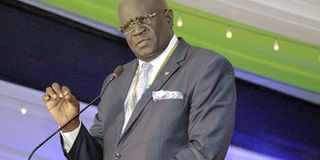University reform must revitalise the sector

Education Cabinet Secretary George Magoha addresses participants of the Kenya Secondary Schools Heads Association 44th annual conference at the Kenya Revenue Authority Training Institute in Mombasa on June 11, 2019. Prof Magoha believes that the higher education sector is ripe for a thorough clean-up. PHOTO | FILE | NATION MEDIA GROUP
What you need to know:
- Prof Magoha accused many universities of mindless expansion, including setting up campuses in inappropriate places such as on top of bars and in marketplaces.
- The fake academics today head academic departments, schools, and universities, and they set and implement policy affecting everyone in the Academy.
Even before he was sworn into office, Prof George Magoha, the new Cabinet Secretary for Education, issued proclamations suggesting that the higher education sector was in for major changes.
He indicated that many universities in the country were issuing worthless paper in the name of degrees, including churning out master's and doctoral graduates with little knowledge in their areas of study.
Prof Magoha accused many universities of mindless expansion, including setting up campuses in inappropriate places such as on top of bars and in marketplaces.
As a result of the irrational expansion and the mounting of ‘worthless’ programmes, most of our public universities are tottering on the brink of insolvency, and every passing day they are asking for bailouts from the government.
IRREGULAR EXPANSION
Prof Magoha’s proposed solution to this crisis in higher education was to freeze the creation of new universities and campuses and to order a re-examination of the existing institutions with the aim of closing down or merging those considered to be unsustainable.
This idea is gaining traction in government. Indeed, the Treasury Cabinet Secretary included it in his budget speech in Parliament this past week, signifying that it has now become official government policy.
So what is the problem in the sector? Firstly, it is true that over the past couple of decades university education has seen massive expansion, with a rapid increase in student numbers without a commensurate increase in academic staff and other facilities.
The result has been a mushrooming of all sorts of university programmes
IMPOSTERS
The resulting graduates have been left to float aimlessly in society, contributing to the rapidly declining esteem of university education in these parts.
Secondly, and perhaps more importantly, the university sector was long ago invaded by counterfeit academics with absolutely no idea what a proper university education entails.
These clueless pseudoacademics have infiltrated not only the classroom and the laboratory, but also the top echelons of the Academy.
They are responsible for the mismanagement of university resources and the irrational expansion of the sector.
The fake academics today head academic departments, schools, and universities, and they set and implement policy affecting everyone in the Academy.
As if that is not enough, they have infiltrated even the regulatory authorities that are meant to ensure the quality of university education in this country.
CLEAN-UP
When asked to set minimum benchmarks for the sector, they impose standards alien to higher education globally, and inadvertently expose their fraudulent occupation of the Academy.
For those two reasons alone, one is constrained to agree with Prof Magoha that the sector is ripe for a thorough clean-up.
It is time to re-establish the Kenyan University as the centre of critical thought, as the crucible in which intellectual leaders are forged.
Let the clean-up begin at the Commission for University Education, and let it not stop until we are left only with properly equipped and staffed universities that will stand out as academic giants on this continent.
Lukoye Atwoli is Associate Professor of Psychiatry and Dean, Moi University School of Medicine; [email protected]





